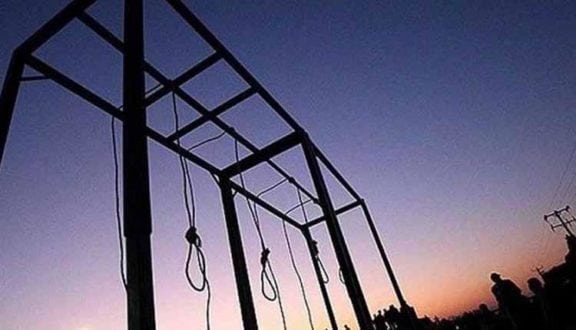Iranwire – A sharp rise in executions in Iran has sparked a passionate call from Iranian civil society to abolish the death penalty in Iran, with a growing number of activists in and outside of the country announcing plans to go on hunger strike to make their voices heard.
The campaign has grown since imprisoned Nobel Peace Prize winner Narges Mohammadi said she and dozens of other women inmates in Tehran’s Evin prison would launch a hunger strike on January 25, following this week’s execution of a young protester who was diagnosed with a mental condition.
“The incarcerated women stand resolute, determined to etch the names of the executed into our collective consciousness,” according to a joint statement posted on Mohammadi’s Instagram account. “They strive not only to preserve the memory of those lost but also to spare the countless lives hanging in the balance within the prisons of the Islamic Republic.”
As the hashtag #NoToExecution was becoming increasingly popular among Iranian social media users, 111 union and labor activists issued a statement on January 25, announcing they were joining the hunger strike to “express our dissent against the government’s misguided practices and pervasive injustices.”
“Executions have claimed countless innocent lives, an irreversible act that warrants no remedy,” said the signatories, who also denounced “inhumane state-sanctioned violence” and “the arbitrary arrest and imprisonment of free and proud individuals.”
Dozens of Iranian journalists, lawyers and prisoners, including jailed artists Toomaj Salehi and Mehdi Yarrahi, said they would also join the hunger strike.
Foreign-based activists such as Masih Alinejad and Hadi Ghaemi, executive director of the US-based Center for Human Rights in Iran (CHRI), have also said they would join the protest action.
“Despite the risk of intensified persecution by the government, Iranian civil society is boldly and unequivocally demanding the abolition of the death penalty,” Ghaemi said in a statement.
“Executions, a longstanding and favored tool of the Islamic Republic to suppress dissent, have surged since nationwide anti-state protests erupted in September 2022,” he added. “Yet these state-sanctioned killings are proving ineffective at muzzling calls for justice, and despite the risks, we witness a mounting outcry from within Iran for an end to these hangings.”
The execution of Mohammad Ghobadlou on January 23 was widely condemned by activists and rights groups who noted that the 23-year-old man suffered from bipolar disorder and that the Supreme Court had struck down the initial death sentence ruling.
Following an unfair trial, Ghobadlou was sentenced to death for allegedly killing a police officer during nationwide protests in September 2022 .
He is the ninth person to be executed in connection with the popular uprising.
Amnesty International said Ghobadlou’s execution marked a “plunge into new realms of cruelty” by the country’s leadership.
France’s Foreign Ministry said it “adds to the many other serious and unacceptable violations of fundamental rights and freedoms committed by the Iranian authorities.”
UN High Commissioner for Human Rights Volker Türk expressed alarm over the “sharp spike” in the use of the death penalty in Iran, and insisted that “the right to due process and a fair trial for all defendants [in Iran] must be adhered to.”
Iranian human rights groups say the Islamic Republic executed more than 700 prisoners last year.
Human Rights Watch said at least 11 inmates in Iran are at “imminent risk” of execution, most of whom are Kurdish.
 Shabtabnews In this dark night, I have lost my way – Arise from a corner, oh you the star of guidance.
Shabtabnews In this dark night, I have lost my way – Arise from a corner, oh you the star of guidance.



